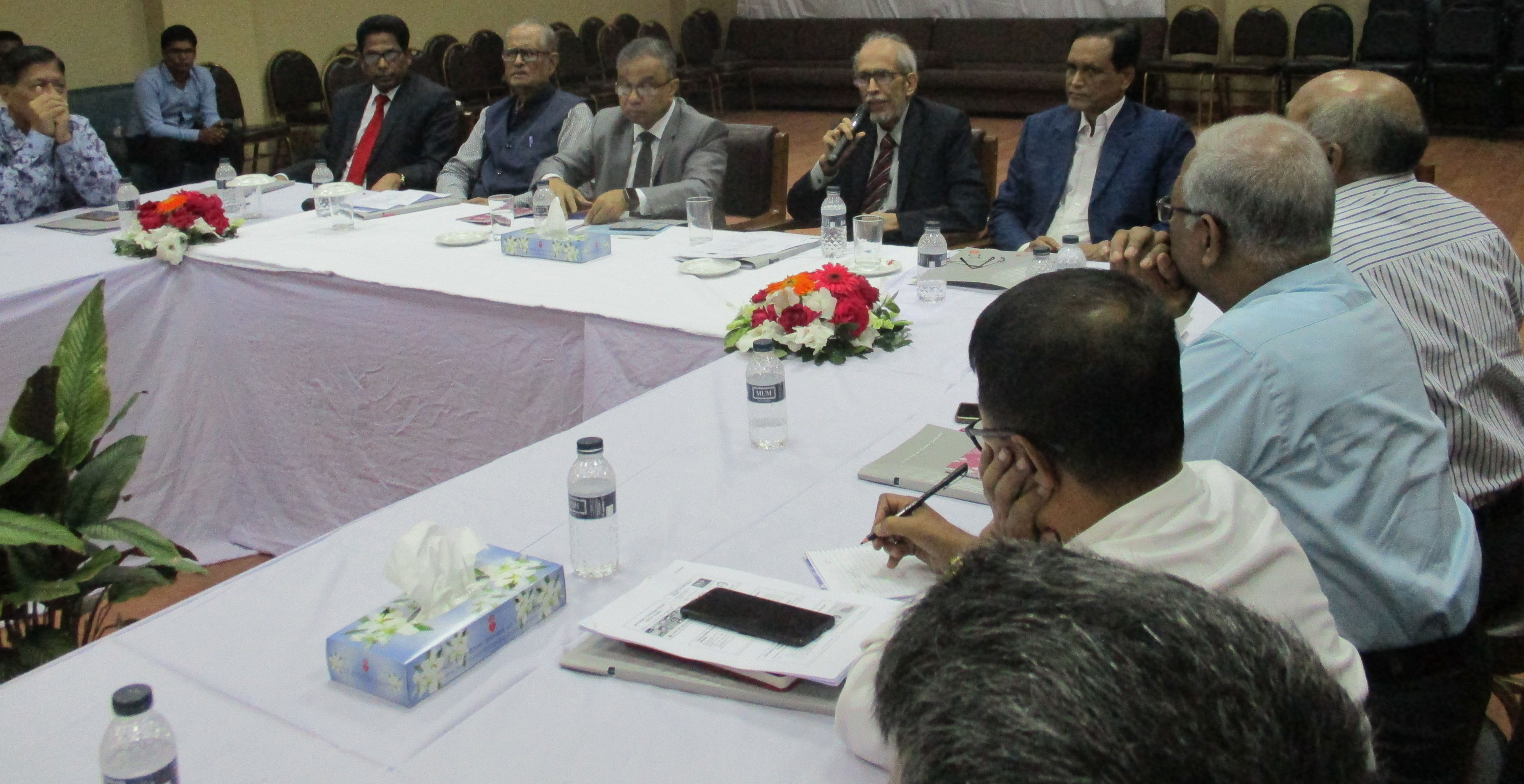
National Heart Foundation of Bangladesh organized a meeting on 10 November 2018 titled ‘NCDs & Tobacco: A barrier to achieve SDGs’. Mr. Md. Abul Kalam Azad, Principle Coordinator (SDG Affairs), Prime Minister's Office graced the meeting as Chief Guest. Mr. Md. Habibur Rahman Khan, Additional Secretary (World health & Public health), Health Services Division, Ministry of Health & Family Welfare and Dr. Noor Mohammad, Line Director, NCD control program, Directorate General of Health Services were present as special guests at the event. National Professor Brig. (Rtd.) Abdul Malik presided over the meeting. The meeting was held with the support from Campaign for Tobacco Free Kids (CTFK).
Journalists from different print & electronic media, representatives from United Forum Against Tobacco (UFAT), Bangladesh Network for NCD Control & Prevention (BNNCP), National Tobacco Control Cell (NTCC) and anti-tobacco organizations also attended the meeting. In the meeting Professor Dr. Sohel Reza Choudhury, Head of the Department, Epidemiology & Research, presented the key note presentation. After that a short video TVC & a presentation on SDGs were demonstrated by the chief guest, Mr. Md. Abul Kalam Azad. The government's initiatives, achievements and way forwards on different sectors including health were focused on this presentation.
An open discussion was taken place. Physicians, journalists, representatives from anti-tobacco organizations shared their views and experiences in this open session. Shishir Morol, Special reporter, the Daily Prothom Alo emphasized on developing a national database for NCD patients to asses and combat the NCD situation of Bangladesh. He also pointed on building awareness. Shushanta Sinha, Special Reporter, Jamuna Television mentioned about NCD & tobacco use, disheartening environment pollution at Saint Martin's Island and sought for complete ban on tobacco use in public places. They also requested to the govt. officials for funding to organize campaigns to make people aware of NCDs & harms of tobacco.
The representatives of UFAT & BNNCP also urged for govt. funding on the issues. Divesting of Government's shares and Honorable President's share from tobacco companies, recent incident between Akij Group and Japan Tobacco, developing national tobacco control program utilizing the money earned from health development surcharge, using smoking scenes in a Government granted film violating tobacco control law also came out from this open discussion session.
The Chief Guest and special guests given patience hearing to the participants and taken notes. Dr. Noor Mohammad, Line Director, NCDC, said that, the Govt. cannot make all the changes alone. Govt. and Non Govt. organizations, media, corporate houses all should come forward to fight the risks of NCDs. Especially organizing awareness seminars, huge report generating in print and electronic media are need, he opined.
Mr. Md. Habibur Rahman Khan, Additional Secretary, given a brief description on the national level tobacco control activities and current scenario to the participants. He requested to the corporate houses to launch awareness campaign against NCD & tobacco under their CSR activities. Besides, the MoHFW will also start those campaigns in a few days.
Mr. Md. Abul Kalam Azad, Principle Coordinator (SDG Affairs) admitted the need of a roadmap and action plan to make Bangladesh tobacco free by 2040 according to the commitment from Honorable Prime Minister. On the spot he ordered Mr. Md. Habibur Rahman Khan to develop a roadmap within two months. He also explained that, Govt. can impose ban on tobacco, but it will not be effective, if the people are not aware of tobacco harms. So the first priority should be creating awareness among the mass people. To achieve the SDGs, we must fight NCD and one of its major causes is tobacco. He also addressed smoking and smokeless tobacco with same importance. Mr. Azad told that, Ministry of Agriculture and Ministry of Finance need to work together to reduce tobacco production. Because, the revenue we get from tobacco industry, a far more money is spent for the treatment of NCDs, which are caused by tobacco. So, we have to stop tobacco use in order to fight NCDs to achieve SDGs.
National Professor Brigadier (Rtd.) Abdul Malik mentioned about the advocacy with Prime Minister's Office and about the meeting with Honorable Prime Minister where he submitted recommendations on developing the road map and action plan to achieve the target making Bangladesh tobacco free by 2040. He appreciated the well-timed role of Mr. Md. Abul Kalam Azad for the road map and action plan. Ending of a short speech Professor Malik thanked to all for attending and reciprocate participation in the meeting.
Couple of print and online medias made coverage on this meeting.